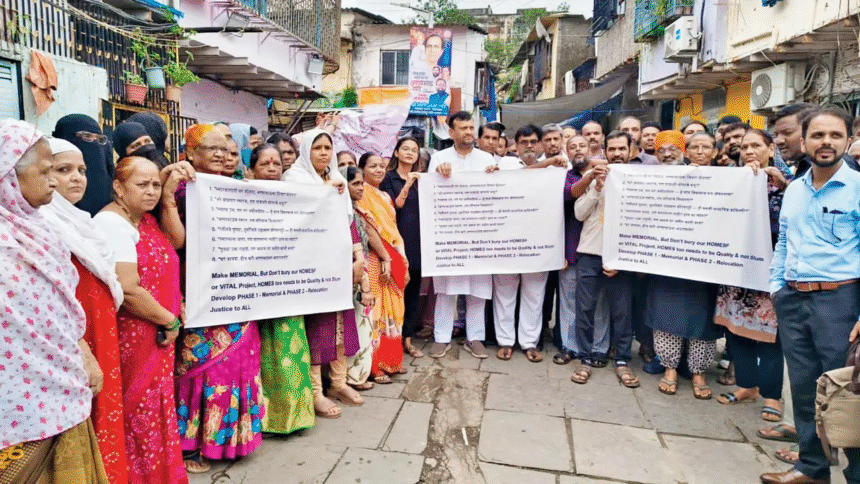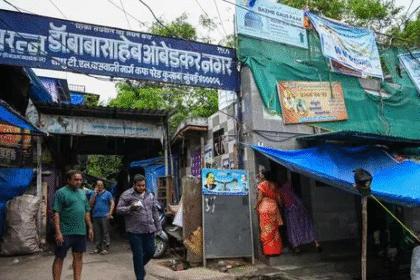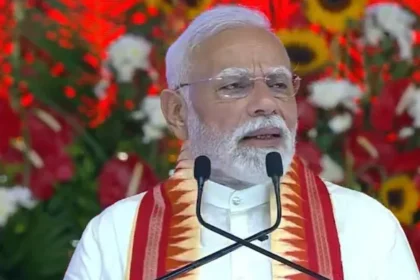Mumbai Shock: 220 Families Face Eviction for Rs 360 Crore Memorial Project in Ghatkopar
Mumbai’s Rs 360 crore memorial project in Ghatkopar is set to displace 220 families, sparking protests and concerns over forced evictions and loss of homes in one of the city’s densely populated areas
Residents of Chirag Nagar in Ghatkopar West organised a silent protest on Friday, opposing the declaration of the area as a slum. The government had declared that a memorial would be built there to honour Anna Bhau Sathe, a Marathi writer, poet, and social reformer who penned some of his greatest works while residing in the area. Residents have alleged that this is a ploy to displace the 220 families that reside in Chirag Nagar, and that Slum Rehabilitation Authority (SRA) officials have been visiting the area since June 2023 to pressure them into vacating the area despite not conducting proper surveys.
After failing to receive permission from the Ghatkopar police to hold a formal protest, the residents gathered at the entrance of their area to greet those visiting Anna Bhau’s former home and share their grievances.
Anil Sathe, Anna Bhau’s grandson, told mid-day, “We understand that the authorities want to pay homage to Anna Bhau, but does it have to come at the cost of our homes? These are the streets that Anna Bhau himself walked on, and he was a pillar of the community. If the area receives an SRA tag, the community will be scattered.”
Residents stated that officials had claimed that they would get to reside in the area once the development is completed, but the proposed memorial would take up a lot of space, leaving them with less living space.
Shahaji Nanai Thorat, who has been living in Chirag Nagar for the past 40 years, has been meticulously documenting the notices sent by SRA. He alleged, “The SRA people have not followed proper procedures and have come here after 6.30 pm some days, which isn’t allowed. They have not conducted a proper survey and are expecting us to move to Azad Nagar, a nearby area. When we go to the meeting and hearings with proper documentation, they never listen to us, but only tell us the date of the next hearing.”

Residents of both areas have together decided not to accept the terms set by the SRA. Thorat said, “We are not okay with moving to Azad Nagar or anywhere far off. There is a vacant land between Narayan Nagar, Mandir and Sawanthwadi, if the authorities build temporary homes for us there. We are willing to shift for the time being.”
The current redevelopment is Phase 1 of a larger plan to redevelop all areas adjoining Chirag Nagar.
This paper contacted the SRA but didn’t receive a reply to its queries by press time.
Anna Bhau Sathe (1920–1969) was a Marathi writer, poet, and social reformer from Maharashtra who used literature as a tool to highlight the struggles of the oppressed and marginalised. Sathe wrote novels, short stories, plays, and ballads, becoming a key figure in the Dalit literary movement. His most famous work, Fakira, which he wrote while residing in Chirag Nagar, won critical acclaim and resonated with the masses. Deeply influenced by communism, Sathe also actively participated in the labour movement, making him a voice of the people.
A storm of controversy is brewing in Mumbai as 220 families living in Ghatkopar East face imminent eviction to make way for a Rs 360 crore memorial project. The development has triggered widespread concern over forced displacement, alleged lack of transparency, and the cost of prioritizing symbolic infrastructure over people’s basic housing rights.

The proposed project—intended to honor a prominent political or historical figure (exact identity undisclosed in official announcements so far)—is planned on land currently occupied by hundreds of families who have lived there for decades. For many, this land is not just a physical space but a generational home. The prospect of sudden eviction, with minimal clarity on rehabilitation, has raised serious questions about urban planning priorities and the human cost of such monumental endeavors.
According to official sources, the memorial will span a significant land parcel in Ghatkopar and is expected to include a towering statue, landscaped gardens, a museum, and a plaza. The budget for the project has been pegged at Rs 360 crore, drawing sharp criticism from housing rights activists and local opposition leaders who argue that such funds could be better utilized in resolving Mumbai’s long-standing housing crisis.
Residents in the affected neighborhoods claim they received notices with minimal warning and little information on relocation or compensation. A majority of the families facing displacement are from lower-income groups, many of whom have been residing in the area for over 30 to 40 years, with official documents like electricity bills, voter ID cards, and Aadhaar linked to their current addresses.
The issue has sparked political friction, with opposition parties slamming the ruling government for prioritizing grandeur over public welfare. Protests erupted in parts of Ghatkopar on Saturday, with residents carrying placards reading “Homes Not Statues” and “Don’t Bulldoze Our Lives.”
Leaders of local civic groups have demanded that the government halt the project until fair and adequate rehabilitation plans are finalized. Some activists are also preparing to take the matter to court, citing violations of the Right to Housing under Article 21 of the Indian Constitution.
“This is yet another instance where the poor are being sacrificed for the vanity projects of politicians,” said housing rights advocate Nandita Rao. “Public money is being used to glorify individuals, while 220 families are being pushed into uncertainty.”
Municipal officials have defended the move, stating that the memorial is of “national significance” and will enhance Mumbai’s cultural landscape and tourism appeal. They claim that the affected residents will be given rehabilitation flats under the SRA (Slum Rehabilitation Authority) scheme, though details on timelines and locations remain vague.
“We are working with housing boards to ensure no family is left homeless,” a senior BMC official told reporters, “but the larger vision of the memorial cannot be compromised.”
The Ghatkopar memorial controversy is the latest flashpoint in the ongoing debate over urban redevelopment in Mumbai. From slum clearances to infrastructure expansion, the city has repeatedly witnessed projects that promise growth but also result in social upheaval.
Critics argue that without inclusive planning, where stakeholders—especially residents—are consulted, such projects only deepen socio-economic divides.
Read Also : Siraj’s 4-Wicket Burst Ignites India’s Comeback After England’s 150-Run Opening Blitz in 5th Test







